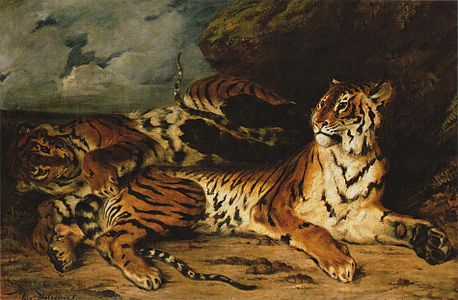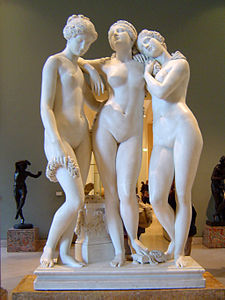This is an old revision of this page, as edited by Lord Cornwallis (talk | contribs) at 00:04, 20 December 2024 (←Created page with 'thumb|370px|''] The '''Salon of 1831''' was an art exhibition held at the Louvre in Paris between June and August 1831.<ref>Pomarède & Trébosc p.222</ref> It was the first Salon (Paris) during the July Monarchy and the first to be held since the Salon of 1...'). The present address (URL) is a permanent link to this revision, which may differ significantly from the current revision.
Revision as of 00:04, 20 December 2024 by Lord Cornwallis (talk | contribs) (←Created page with 'thumb|370px|''] The '''Salon of 1831''' was an art exhibition held at the Louvre in Paris between June and August 1831.<ref>Pomarède & Trébosc p.222</ref> It was the first Salon (Paris) during the July Monarchy and the first to be held since the Salon of 1...')(diff) ← Previous revision | Latest revision (diff) | Newer revision → (diff)
The Salon of 1831 was an art exhibition held at the Louvre in Paris between June and August 1831. It was the first Salon during the July Monarchy and the first to be held since the Salon of 1827, as a planned exhibition of 1830 was cancelled due to the French Revolution of 1830.
Exhibition
Liberty Leading the People by was amongst the most notable works exhibited. Painted in Romantic style it depicts the recent July Revolution that had brought the reigning monarch Louis Philippe I to power over his cousin Charles X. It features the Liberty (also identified at Marianne) leading the Paris crowds forwards. The revolution was also represented in two paintings in The Battle of Rue de Rohan and The BattlePorte Saint-Denis by Hippolyte Lecomte. Also on display were two portraits by Alexandre-Marie Colin of the poet Jean-Georges Farcy, killed during the storming of the Tuileries Palace.
History paintings on display featured several works by Paul Delaroche who included several scenes from British history including The Children of Edward depicting the Princes in the Tower and Cromwell Opening the Coffin of Charles I.
Horace Vernet, the director of the French Academy in Rome sent in several portraits he had produced in Italy including xxx and Portrait of Louise Vernet depicting his daughter and future wide of Paul Delaroche. His other works on display included Italian Brigands Surprised by Papal Troops. The Salon featured elements of Orientalism, an increasingly fashionable genre that would grow through subsequent years in the wake of the French invasion of Algeria in 1830.
It was followed by the Salon of 1833, the last time the Salon was staged biannually as future exhibitions from 1834 were held every year.
Gallery
-
 Portrait of Maria Malibran by Henri Decaisne
Portrait of Maria Malibran by Henri Decaisne
-
 Rebecca and Brian de Bois by Leon Cogniet
Rebecca and Brian de Bois by Leon Cogniet
-
 Charles I Receiving a Rose by Eugène Lami
Charles I Receiving a Rose by Eugène Lami
-
 The Arrest of Charlotte Corday by Hendrik Scheffer
The Arrest of Charlotte Corday by Hendrik Scheffer
-
 Portrait of Daniel-François-Esprit Auber by
Portrait of Daniel-François-Esprit Auber by
-
 Portrait of Jean-Georges Farcy by Alexandre-Marie Colin
Portrait of Jean-Georges Farcy by Alexandre-Marie Colin
-
 Portrait of Jean-Georges Farcy by Alexandre-Marie Colin
Portrait of Jean-Georges Farcy by Alexandre-Marie Colin
-
 The Barge of Cardinal Richelieu on the Rome by Paul Delaroche
The Barge of Cardinal Richelieu on the Rome by Paul Delaroche
-
 Cardinal Mazarin Dying by Paul Delaroche
Cardinal Mazarin Dying by Paul Delaroche
-
 The Children of Edward by Paul Delaroche
The Children of Edward by Paul Delaroche
-
 Cromwell Opening the Coffin of Charles I by Paul Delaroche
Cromwell Opening the Coffin of Charles I by Paul Delaroche
-
 The Marriage Contract by Guillaume Bodinier.
The Marriage Contract by Guillaume Bodinier.
-
 Jacques-Louis David by François Rude
Jacques-Louis David by François Rude
-
Portrait of Lady Caroline Montagu by George Hayer
-
The Death of Virginia by Guillaume Guillon-Lethière
-
 Portrait of Louise Vernet by Horace Vernet
Portrait of Louise Vernet by Horace Vernet
-
 Italian Brigands Surprised by Papal Troops by Horace Vernet
Italian Brigands Surprised by Papal Troops by Horace Vernet
-
 Judith and Holofernes by Horace Vernet
Judith and Holofernes by Horace Vernet
-
 A Young Tiger Playing with Its Mother by Eugène Delacroix
A Young Tiger Playing with Its Mother by Eugène Delacroix
-
 Battle of Porte Saint-Denis by Hippolyte Lecomte
Battle of Porte Saint-Denis by Hippolyte Lecomte
-
 Combat de la rue de Rohan by Hippolyte Lecomte
Combat de la rue de Rohan by Hippolyte Lecomte
-
 The Three Graces by James Pradier
The Three Graces by James Pradier
References
- Pomarède & Trébosc p.222
- Ruutz-Rees p.84
- James p.227
- Harkett & Hornstein p.111
Bibliography
- Boime, Albert. Art in an Age of Counterrevolution, 1815-1848. University of Chicago Press, 2004.
- Harkett, Daniel & Hornstein, Katie (ed.) Horace Vernet and the Thresholds of Nineteenth-Century Visual Culture. Dartmouth College Press, 2017.
- James, Regina. Losing Our Heads: Beheadings in Literature and Culture. NYU Press, 2005.
- Noon, Patrick & Bann, Stephen. Constable to Delacroix: British Art and the French Romantics. Tate, 2003.
- Pomarède, Vincent, Trébosc, Delphine. 1001 Paintings of the Louvre: From Antiquity to the Nineteenth Century. 5 Continents, 2006.
- Ruutz-Rees, Janet Emily. Horace Vernet. Scribner and Welford, 1880.